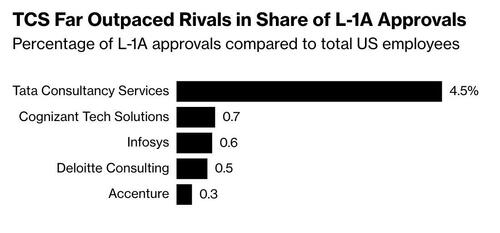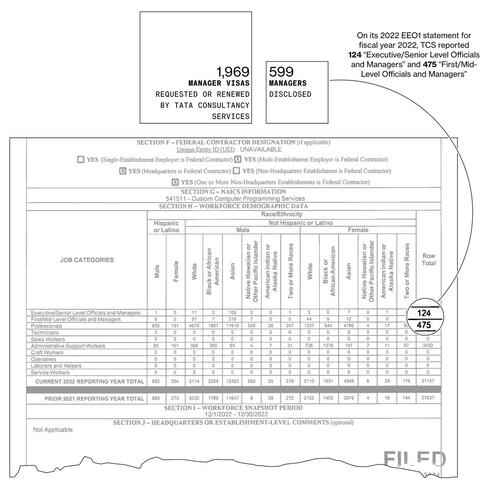In 2017, as Donald Trump took office with a crackdown on employment visas, former Tata Consultancy Services (TCS) IT manager Anil Kini alleges he was ordered to falsify internal organizational charts to make the company appear more manager-heavy.
Kini claims this was a cover-up to evade scrutiny over TCS’s use of L-1A manager visas, which have fewer restrictions than H-1B visas and lack minimum pay requirements, according to a new feature by Bloomberg.
Kini and two other former TCS employees filed whistleblower lawsuits under the False Claims Act, alleging the company used L-1A visas to bring in non-managerial workers. However, the cases were dismissed before the visa fraud claims were examined, with Kini’s still under appeal. He says he resisted altering the charts and was fired in 2018 after filing his lawsuit.
Federal data reviewed by Bloomberg indicates that TCS has received more L-1A approvals than the number of managers it disclosed to the U.S. Equal Employment Opportunity Commission, suggesting possible misuse of the visa program. TCS, which serves major U.S. tech firms, has secured more L-1A visas than any other employer in recent years.
The company denies any wrongdoing, stating that courts have already dismissed these allegations.
While Trump initially opposed employment visas, arguing they undercut American workers, his stance has shifted, now expressing support for such programs. This has created tensions between his traditional nationalist base and newer tech-industry allies. Meanwhile, legal experts note that gaming the L-1A program is common, with federal authorities uncovering nearly 200 cases of misuse in the past decade.
The Bloomberg feature says that False Claims Act lawsuits let whistleblowers sue companies on behalf of the U.S. government, often alleging corporate fraud against taxpayers. These cases gain traction when the Justice Department joins, but the DOJ declined to back any lawsuits against TCS over L-1A visa misuse, including Anil Kini’s.
TCS stated in legal filings that an internal review found “most of the issues raised” by Kini were unsubstantiated and claimed it had “already taken corrective action” on those that were. However, the company did not disclose what its inquiry revealed. A federal judge dismissed Kini’s case in February, ruling he failed to prove how TCS’ visa practices violated financial obligations to the U.S. government.
Kini, who appealed the decision, says he refused to alter organizational charts and filed two internal complaints before suing in 2017. He was fired the following year, which he calls retaliation. TCS did not comment on his dismissal. “I was proud to be working for TCS,” he said. “But then some things in life, there should be integrity in what you do.”
In another case, Vinod Govindharajan, an Indian national, alleges TCS falsely claimed he was a manager in 2013 to secure an L-1A visa, bypassing stricter H-1B rules. He says the company brought him to New Jersey, where he worked a sales job with no subordinates and was paid half of what American colleagues earned. Frustrated, he filed a 2018 complaint with the EEOC, which later found “credible documentary evidence” that TCS “frequently falsifies documents in support of L-1 visa applications.” The agency also determined Indian visa workers were underpaid and that TCS retaliated against Govindharajan for speaking out.
However, the EEOC lacks authority over immigration or employment visa wage laws, which fall under separate federal agencies. There’s no indication it shared its findings with them. An EEOC spokesperson cited confidentiality rules in declining to comment. “It was a dream of mine to move to the U.S.,” Govindharajan said. “But I was doing a sales role, nothing to do with management.”
You can read the full writeup here.

